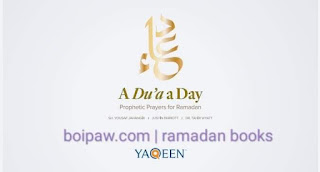A Dua a day - Prophetic Prayers for Ramadan pdf by Yaqeen team | Ramadan Books For Everyone
How to use A Dua a days?
In total there are twenty-nine supplications in this small booklet. They revolve around four themes pertinent to the month of Ramadan: guidance, good habits, prayers for others, and supplications specific to the last ten nights. However, our goal is not simply that you memorize the duʿāʾ. We want you tounderstand the duʿāʾ. This is why we have added a brief overview of each duʿāʾ to help you better understand its meaning.
a dua a day pdf download ⤵️
 |
| a dua a day book cover photo |
We recommend following the booklet in order,
devoting each day to reading one duʿāʾ, its
translation, context, overview, and notable
benefits. We also recommend memorizing
these supplications and adding them to your
daily acts of worship. If you dedicate just a
few minutes daily, you will complete this
booklet by the end of Ramadan inshāʾAllāh.
Abu Abdul rahman Books
All Praise is for Allah, Lord of the Universe,
the Only One worthy of worship. Peace and
blessings be upon the final messenger
Muhammad صلى الله عليه وسلم and all those who follow his way with righteousness until the end of
time. He taught us how to worship our Lord and his teachings are sufficient for us, exemplifying the best manner of calling on Allah.One of the greatest acts of devotion that we can perform in the blessed month of Ramadan, and at any other time of the year
for that matter, is supplication (duʿāʾ). The Prophet صلى الله عليه وسلم said, “Supplication is (the
essence) of worship.”1
Children Books In Arabic
Every act of worship carries an explicit duʿāʾ (such as prayer) or an implicit duʿāʾ by which we ask Allah to
accept whatever good deed we are doing. The best supplications are taken verbatim from the Qur’an and Sunnah. Some of them are more powerful and concise than others, while some are more appropriate to a specific context. The Prophet صلى الله عليه وسلم once passed by his wife Juwayrīyah who had been supplicating in her place from the time
of fajr until after sunrise. He صلى الله عليه وسلم said to her,
“I said four statements after I left you, three
times each. If these words were weighed
against whatever you have said since this
morning, it would surely outweigh them:
Glory be to Allah and His praise by the
number of His creation, by His pleasure, by
the weight of His Throne, and by the
vastness of His words.”2
Dua Related Books PDF
We should strive to memorize prophetic
supplications and utilize them often. If we are unable to do so, then understanding them and utilizing their translations can suffice. Prophetic words have a special impact on the heart, particularly because of
the rich meaning of the original Arabic and the wisdom of the All-Wise Who revealed them. We must also strive to cleanse our hearts of arrogance, lowly desires, and other such spiritual flaws in order to
maximize the positive impact duʿāʾ can have upon us. Duʿāʾ itself is a means of purification of the soul.
While it is permissible to supplicate in our own wordings in any language, it is also possible to
transgress in supplication. This can happen if we do not follow the proper etiquette or conform
to the Qur’an and Sunnah. ʿAbdullāh ibn Mughaffal (ra) heard his son supplicating, “O Allah, I
ask You for the white palace on the right side of paradise when I enter it.” ʿAbdullāh said, “O my
son, ask Allah for paradise and seek refuge in Him from the hellfire, for I heard Allah’s Messenger
صلى الله عليه وسلم say: There will come some people who will transgress in ritual purification and in duʿāʾ.”3
Kalarab Ramadan Songs Mp3 Download
In this instance, going into such detail and asking for very specific things is frowned upon. ʿĀʾishah
said, “Allah’s Messenger صلى الله عليه وسلم used to like comprehensive duʿāʾ and would leave off other kinds.”4
This is why it is so important to adhere to the etiquette of duʿāʾ.



Comments
Post a Comment
ℹ️ Your Opinion is very important to us, Please Writer your comment below about this Post.....